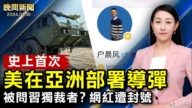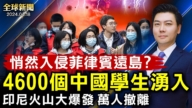【新唐人2011年12月15日訊】中國正式加入世界貿易組織WTO今年邁入第十年,過去美中兩國貿易糾紛不斷,美國向世貿組織指控中國涉嫌違反世貿規則項目多達12項。12號,美國貿易代表辦公室提交給國會的年度報告說,中國到現在沒有完全遵守基本自由市場原則,不少國會議員甚至對中國入世的好處持懷疑態度。
中國花了15年的時間才正式加入世界貿易組織,25年來,北京政府雖然在市場准入、降低關稅、知識產權保護等方面作了一系列法規修訂和承諾。不過,美國貿易代表處在年度報告中指出,中國廣泛實施干預政策,使用歧視性的監管程序、和非正式的禁止入境等種種手段,嚴重影響美國企業的利益。
不過美國一些國會議員認為,美國對華貿易的巨額赤字,導致美國製造業數以百萬工人失業。
《新唐人》時事評論員文昭表示,由於中共政府是個集權專制國家,他能夠做一些民主國家做不到的事情,如壓低勞動力成本、原料成本,使產品出口具有廉價的優勢,然後傾銷到歐美國家。
文昭:「中國的廉價商品銷售到美國以後,使美國的消費者,北美的消費者買到了便宜貨,這看起來也許是有一些好處。但與此同時呢,它也使得製造業一些國家衰落,增加了失業率。」
中國「入世」後,出口規模迅速擴大,從2001年佔世界的4.3%,居全球第六位,到2010年的10.4%,位居世界第一位。美國貿易代表處的報告認為,只有中國在完全遵守世貿基本規則的前提下,才能保障全球經濟體系的平衡發展。
中國通過貿易賺到了大量的外匯,但他並有拿來購買別的國家商品,帶動歐美國家經濟復甦。
文昭:「那麼他是用這些儲備外匯去購買鉅額美債,當他成為美債主要持有人之後,他就利用這些法碼去要脅美國政府。」
美國「南卡羅萊納大學」艾肯商學院教授謝田表示,美國政府比較不滿的是:中國操縱匯率和知識產權問題。
謝田:「就我們現在看的報導,中共從來就沒有想說遵守他的承諾,對中國來說加入世貿組織以後呢,他的出口對西方美國出口大幅的增加,他用這辦法來帶動就業,推動經濟,創造就業機會,促進中國周圍都是增工廠的發展,賺取大量的外匯。」
謝田表示,中國大量的外匯儲備都是從美國貿易得到的,卻擊垮了美國的製造業,造成美國失業率上升,這是美國老百姓所不願接受的。中國在自由貿易中破壞了市場機制,受到西方國家的反彈也是必然的。
新唐人記者易如、李庭、朱娣採訪報導。
China 10 Years in WTO: USTR Report
China is an official member of the World Trade Organization
(WTO) for 10 years now.
However, trade disputes between US and China still continue.
The US has accused China of violating up to 12 WTO rules.
On December 12, the US Trade Representative’s (USTR)
office issued its annual report to the Congress.
The report stated that China still does not comply
with basic free market principles.
Many members of Congress are even skeptical
about China’s accession to the WTO.
It took China and the Chinese Communist Party (CCP)
15 years to officially join the WTO 10 years ago.
In the last 25 years, the CCP made a series of regulatory
amendments and commitments to market access.
These include lowering tariffs
and intellectual property protection.
Now the USTR office’ annual report states,
that China is not embracing fully the principles of WTO.
Widespread interventions, discriminatory regulatory procedures,
and informal methods seriously affect US companies’ interests.
Some US Congress members even think the huge trade deficit
to China leads to millions of US’ manufacturing job losses.
NTD commentator Wen Zhao said, as China is a centralized
authoritarian state, it can do things democratic countries cannot.
Like lowering labor costs and raw material costs
to lower the costs of the exported goods.
Wen Zhao: “The dumping of cheap goods
benefited the consumers of Europe and the US.
At the same time, this led to the decline of the manufacturing
industries in these countries, rising the unemployment rate."
After joining WTO, China’s share in the world export grew
from 4.3% (2001, ranked 6th) to 10.4% (2010, ranked 1st).
Now the USTR report points out, only if China fully follows
the WTO rules will the global economic system be guaranteed.
China has accumulated a substantial amount
of foreign exchange reserves through trade.
However, China did not use the reserves to buy goods in other
countries to help the economic recovery in Europe and the US.
Wen Zhao: “China used these foreign exchange reserves
to buy huge amounts of the US debt.
When China became a holder of the US debt,
it went on to use this to intimidate the US government."
Professor Xie Tian from the Aiken School of Business,
University of South Carolina agrees with that.
He believes the US government is not satisfied with China’s
manipulation of currency and handling of intellectual property.
Prof. Xie Tian: “From the report now it can be seen again
that CCP does not like to kept it’s promises.
For China, after joining the WTO, exports to the West,
and especially the US, have increased rapidly.
China used the exports to boost employment and economy,
create jobs, and promote the manufacturing, as to gain foreign exchange reserves."
Prof. Xie said, a massive amount of China’s foreign exchange
reserves are obtained from the trade operations with the US.
This has weakened the manufacturing sector of the US,
resulting in the rising unemployment rate.
Thus China needs to fully embrace the principles of the WTO,
as to erase the skepticism about its accession to the system.
NTD reporters Yi Ru, Li Ting and Zhu Di.

























